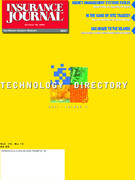The amount of pain and suffering that people have to deal with in the normal course is already there, then it’s compounded when people show their worst side at times like this,” said John Eager, senior director of claims for the National Association of Independent Insurers.
In light of the tragedies that impacted New York City, Washington, D.C., and Pennsylvania last month, insurers are fighting the problem of false claims that have already begun to surface related to death and destruction.
Department takes positive approach
According to Terri Marchon, a spokeswoman for the New York Department of Insurance, the department is taking a proactive approach.
The department has been working with the New York City Police Department’s Auto Crime Unit in the weeks following the attacks to remove all vehicles from the site and take down all the information to identify those cars. “We’re doing that to make sure there’s no automobile insurance fraud,” Marchon commented.
According to Eager, auto fraud specialists might attempt to submit losses for damaged or destroyed cars that were nowhere near lower Manhattan at the time of the disaster by obtaining vehicle identification numbers (VINs) from cars at junkyards to create phony registration for a claim submission.
“I think it’s really early, but we’re on top of the fraud side,” Marchon commented.
Two weeks after the attacks, the governor’s office began the process of issuing death certificates so that people could claim insurance and other benefits from loved ones who remained missing.
Marchon said the response from the insurance industry has been tremendous. “The industry and all of the commissioners from across the country have offered resources and support.”
Patience to play key role in recovery
The process of recovery will obviously take weeks, months and even longer in some cases. According to Eager, many challenges face the industry as it tries to settle as many claims as possible in a quick and accurate manner.
“Following every disaster there is a period of time when the people affected are disoriented,” Eager said. “With the extended search and recovery effort, crime scene investigation, and extensive personal disruption experienced, it may take longer for individuals to focus on filing claims and get back into their normal routines. Many of these same factors will make it difficult for adjusters to obtain the necessary information to quickly resolve policyholder claims.”
Marchon pointed out that all the preparations could still leave officials searching for answers with a crisis of this magnitude. “I don’t think anyone could have ever imagined it. Fortunately, you sometimes do prepare for things you never think will happen. The death toll is totally unacceptable, but fortunately they had disaster plans in place.”
NAII looks for patterns in fighting fraud
Knowing that some individuals will run afoul of the law, Eager noted that investigators of insurance fraud are searching for “patterns.”
“You look for patterns early on,” Eager said. “These pattern recognitions are sometimes indications of fraud and will be picked up with the new ability to fight fraud with the integrated databases available…criminals will likely use the umbrella of the World Trade Center, trying to get under it and saying you’re part of that group of claimants is very likely. You could say you were making deliveries in the building, you had a car parked nearby, any number of things. You look to see if a large number of people are using the same doctor in making their claims.”
According to Eager, there are several paths for criminals to take during this difficult time. “I think the auto fraud is probably the easiest to run up front,” Eager noted. “I think you’ll also see some small business scams related to business interruption.”
The “mental anguish” scheme can be the most difficult claim for fraudsters to prove. “That’s something we’ll have to work with down the road,” Eager said. “I think it will be more difficult than a crook might think it is.
“If you’re in the building itself, in the immediate vicinity, if you’re trapped, if you see people jumping out the windows in large amounts, I think the Workers’ Comp Board or anybody looking at that will understand that can be trauma. I think people will look to what is causing the trauma itself and what is your standing as a claimant. If it’s there, I think you’ll have a claim under New York law; if not, I think it will be scrutinized. Companies will be vigilant in spotting and prosecuting insurance fraud.”
Eager also looks for claims to come out of the plane crashes at the Pentagon and in Pennsylvania. “Don’t forget you’re going to have business interruptions claims coming from the D.C. area,” he pointed out. “They cordoned off a number of square blocks around the event where those businesses couldn’t take in any business.”
Arrests are made, warnings issued
Less than three weeks after the tragedies at the World Trade Center, two individuals were arrested for making false claims regarding losing loved ones in the building.
According to a report in the New York Post, two different people indicated they had loved ones lost in the WTC, when in fact, these individuals were located. One person was charged with forgery, another with filing a false report. The quick arrests can be linked in part to the industry’s efforts to fight fraud in recent years.
The fight against fraud has intensified and will likely continue to grow. According to Eager, NAII spent $300 million on antifraud measures in 2000, and that number has more than doubled in the last year.
“I think you’re seeing more money and resources being put into fighting fraud,” Eager said. “You also have a lot of people being committed to fraud fighting in so-called ‘point of contact.’ They include underwriters or claims personnel. I think we’re getting better at it.”
And what warnings does Eager have for those looking to take advantage of the situation related to Sept. 11?
“I think they’ll be prosecuted to the letter of law,” Eager said. “I don’t think there will be much leniency for people doing things like that. The public outcry would be phenomenal.”
Was this article valuable?
Here are more articles you may enjoy.


 Chubb Posts Record Q4 and Full Year P/C Underwriting Income, Combined Ratio
Chubb Posts Record Q4 and Full Year P/C Underwriting Income, Combined Ratio  After Falling 6% in 2025, Average Auto Insurance Cost Will Stabilize in 2026, Says Insurify
After Falling 6% in 2025, Average Auto Insurance Cost Will Stabilize in 2026, Says Insurify  Uber Jury Awards $8.5 Million Damages in Sexual Assault Case
Uber Jury Awards $8.5 Million Damages in Sexual Assault Case  Zurich Insurance’s Beazley Bid Sets the Stage for More Insurance Deals
Zurich Insurance’s Beazley Bid Sets the Stage for More Insurance Deals 


